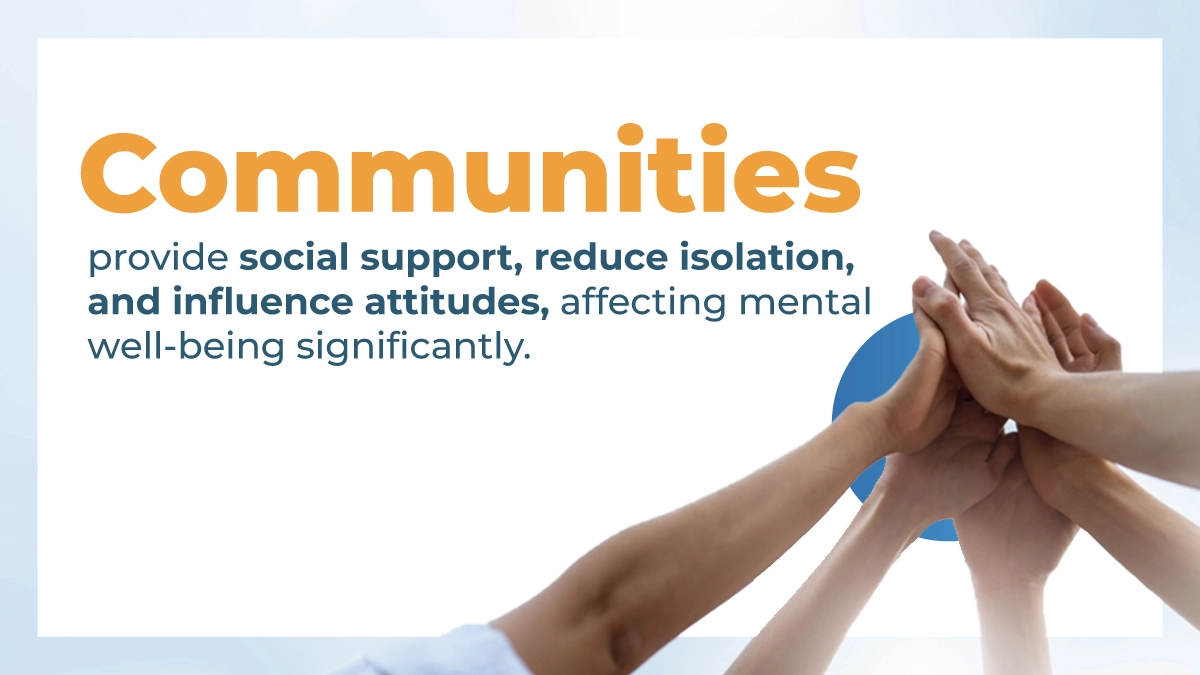
Lyrica With Suboxone: Risks And Safe Practices
The Recovery Team-Newton explores whether taking Lyrica with Suboxone is safe. Explore potential risks and guidelines

The connection between community and mental health is strong and vital. Your community, whether your neighborhood, school, workplace or even online groups, significantly shapes your mental well-being.
Positive interactions with others, a sense of belonging, and access to support can boost your mental health. On the flip side, social isolation, discrimination, or a lack of resources can take a toll on your mental well-being.
In this article, we will explore communities’ pivotal role in shaping mental health outcomes, the challenges faced in addressing mental health at the community level, and ways to enhance mental health awareness within communities.
Community and mental health are deeply connected, influencing one another significantly. Here is what this article touches upon:
Contact The Recovery Team-Newton at (508) 978-2772 for personalized and supportive mental health treatment.
Mental health is a critical aspect of our overall well-being, and it plays a significant role in our daily lives, affecting how we think, feel, and act. Here, we’ll explore the profound importance of mental health for individuals and communities alike.
Mental health is essential for personal well-being. It influences our thoughts, feelings, and behaviors, impacting our daily lives. Good mental health helps us cope with life’s challenges, form meaningful relationships, and experience joy and contentment.
Mental health and physical health are closely interconnected. Emotional and psychological well-being can impact physical health. For example, chronic stress can lead to various health issues, such as heart disease. Maintaining good mental health can contribute to a longer, healthier life.
Mental health is vital to our productivity at work and in daily tasks. When our mental health is checked, we can focus, make sound decisions, and solve problems effectively. On the contrary, poor mental health can lead to decreased productivity and increased absenteeism.
Healthy mental well-being is the foundation for nurturing positive relationships. It enables us to communicate, empathize, and connect with others meaningfully. Mental health fosters stronger bonds with family members, friends, and the community.
A mentally healthy population contributes to a stronger, more cohesive community and society. Individuals who are mentally well are more likely to engage in social activities, volunteer, and support others. This benefits the overall social fabric and quality of life within a community.
Prioritizing mental health, seeking help when necessary, and fostering a culture of understanding and support within our communities can lead to happier, healthier lives.
Communities are more than just a collection of houses and streets; they play a vital role in shaping the mental health of their residents, including children, young people, adults, and old. Let’s explore the significant influence of communities on mental well-being, focusing on the following key aspects.
Communities offer a unique form of social support that can profoundly impact individuals’ mental health. A strong sense of belonging and close-knit relationships within a community can provide a safety net for individuals during difficult times. When people feel connected to others in their community, they are more likely to experience reduced feelings of loneliness, anxiety, and depression. These social connections act as a buffer against life’s stressors and contribute to better mental health outcomes.
Communities serve as a valuable resource for mental health support. They can provide access to local mental health services, peer support groups, and educational resources. These resources can be instrumental in addressing mental health challenges and promoting well-being. In addition, communities often organize events and activities that bring a group together, fostering a sense of community and providing opportunities for individuals to engage in mental health promotion.
The shared experiences within a community can have a healing effect on individuals facing mental health issues. When people openly discuss their struggles and triumphs, it reduces stigma and helps individuals realize they are not alone in their challenges. This shared understanding can be a source of inspiration and hope, encouraging those with mild to severe mental disorders to seek help and support.
Recognizing and nurturing these community connections can create a more compassionate and mentally healthy society.
Community mental health services are vital, but several hurdles hinder their effectiveness. Let’s explore three major challenges in community mental health and how they impact individuals and communities.
Stigma remains a significant barrier to seeking and receiving mental health care within communities. People often feel ashamed or fearful of being judged when discussing their mental health concerns openly. This stigma can lead to individuals suffering in silence and avoiding necessary support. Reducing stigma requires community education and open conversations to normalize discussions about mental health.
Many communities, especially in rural or underserved areas, struggle with limited access to mental health care. There might be a shortage of mental health professionals, and the services available may not be affordable or easily accessible. This lack of access can leave many individuals without the help they need, contributing to the prevalence of untreated mental health conditions.
Cultural diversity within communities can present a challenge in providing mental health care sensitive to different cultural perspectives. Recognizing and respecting cultural differences is crucial to ensure that mental health services are inclusive and effective for all community members. Understanding cultural nuances and tailoring care to specific needs is essential for promoting better mental health outcomes.
By overcoming these obstacles, we can create a more inclusive and supportive environment where individuals can access the mental health treatment they need and deserve.
Raising awareness about mental health in our communities is vital to creating a supportive and understanding environment. Here, we will explore three effective ways to promote mental health awareness within our communities:
One of the key ways to promote mental health awareness in the community is through education. Providing information and resources about mental health can help dispel myths and reduce stigma. Schools, mental health centers, and local community-based organizations can offer workshops and programs that educate community members about mental health issues, the importance of seeking help, and how to support those struggling.
Community leaders, including local government officials, faith leaders, and influential figures, play a crucial role in shaping community attitudes. Engaging these leaders in conversations about mental health can help destigmatize the topic. When community leaders openly discuss mental health and advocate for supportive services, it encourages others to follow suit.
Community events provide a unique platform for promoting mental health awareness. These events offer a safe space for individuals to come together, share their experiences, and learn about mental health in a relaxed setting. By integrating mental health discussions and activities into community events, we create opportunities for people to engage, connect, and feel more comfortable addressing their mental health.
By taking these steps, communities can become more inclusive, empathetic, and supportive environments, making mental health a priority for everyone.
Communities shape mental health by providing support, resources, and a sense of belonging. Strong communities reduce isolation, combat stigma, and offer a safety net for those facing mental health problems.
A community approach to mental health involves local support, awareness, and resources. It focuses on creating a caring, understanding community to address mental health challenges collectively.
Community actions like promoting awareness, reducing stigma, offering support, and ensuring access to mental health services can help prevent mild to severe mental illness and create a mentally healthier environment.
Mental health issues can be overwhelming. At The Recovery Team-Newton, we support you every step towards mental wellness.
Our outpatient services are personalized for your needs. We offer programs like medication-assisted treatment that offer a holistic approach to help you heal.
At our facility, we believe with proper treatment and intervention of the community, you can have the power to overcome these challenges.
Take that courageous step today. Contact (508) 978-2772 for more information.

The Recovery Team-Newton explores whether taking Lyrica with Suboxone is safe. Explore potential risks and guidelines

Learn about Suboxone injection side effects and explore recovery solutions in this guide by The Recovery Team-Newton.